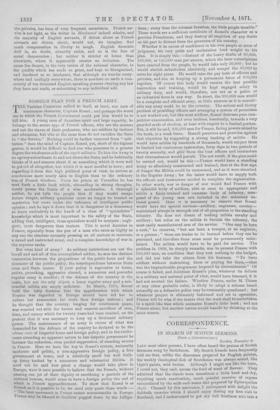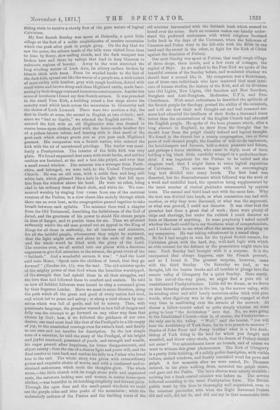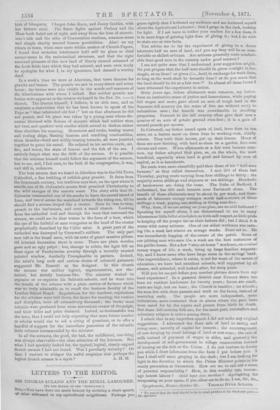CORRESPONDENCE.
IN SEARC1I OF SCOTCH SERMONS.
[Famt A CORRESPONDIM.] London, November 2. Ulm most other persons, I have often heard the praises of Scotch Sermons sung by Scotchmen. My Scotch friends have frequently told me that, unlike the discourses prepared for English palates, the weekly theological dish of Scotchmen was always mixed, like Opie's paints, with brains. Although I might not like the taste, I could not, they said, accuse the food of want of flavour. They admitted that the viands were sometimes a little hard and dry, requiring much mastication, much painful exercise of organs emasculated by the milk-and-water diet prepared by Episcopalian chefs. Cheered by this assurance, I anticipated with delight the Sabbath exercise which I should enjoy during my first visit to Scotland, and I endeavoured to got my dull Southron wits into a
fitting state to receive a steady flow of the pure waters of logical Calvinism.
My first Scotch Sunday was spent at Dalmally, a quiet little village at the foot of a noble amphitheatre of sombre mountains which rise peak after peak in purple glory. On the day that we saw the scene, the solemn heads of the hills were visited from time to time by fleecy, slow-sailing clouds, and the dark rampart was broken here and there by valleys that lead in hazy blueness to unknown regions of beauty. Away to the west stretched the long winding waters of Loch Awe, its silvery surface broken by islands thick with trees. From its wooded banks to the feet of the dark hills, spread out like the waves of a purple sea, a wide extent .of moor ruddy with heather, gray with rough boulders, dotted with small white and brown sheep and clean Highland cattle, made fasci- nating by their shaggy coats and humorous countenances. Amidst this scene of loveliness I found my first Scotch sermon. It was preached in the small Free Kirk, a building raised a few steps above the country road which leads across the mountains to Glenorchy and the shores of Loch Lomond. There were two services a day, the 'first in Gaelic at noon, the second in English at two o'clock ; and, since we "had no Gaelic," we selected the English service. We entered the kirk with an old Highlander who was dressed in coarse home-spun clothes, dyed with the home-made heather dye of a yellow-brown colour, and bearing with it that smell of the peat-reek which always greets you as you pass eaoh Highlaod peasant. His companion was a Scotch terrier, who entered the kirk with the air of accustomed privilege. The terrier was maul- lestly a Presbyterian. The interior of the little kirk was very plain. We found unpainted deal seats with strait backs, and neither cushion nor footstool, at the end a box-like pulpit, and over that a small round window. The minister was a stranger from Perth- -shire, and belonged, we were told, to the United Presbyterian Church. He was an old man, with a noble face and long soft white hair, which glittered like a halo in the light that fell upon him from the window above his head. He wore no robes, being clad in his ordinary dress of black cloth, and white tie. We com- menced worship by singing four verses from one of the metrical versions of the Psalms, to a slow chant-like melody through which there ran an even beat, as the congregation paused together to take breath between each syllable. The minister then read a chapter from the Old Testament, describing the faithfulness of the God of Israel, and the greatness of his power to shield His chosen people in time of danger, and to punish them for sin. Then we all stood referently whilst the old man poured out an appeal to the Kiug of Kings for all those in authority, for all teachers and ministers, for all the faithful people, wheresoever they might be scattered, that the light might arise and shine to the ends of the earth, and the whole world be filled with the glory of the Lord. The exercise over, we all settled into our places with a decorous eagerness to give full attention to the sermon, the great event of the
Sabbath." And a wonderful sermon it was "And the Lord said unto Moses, Speak unto the children of Israel, that they go forward'" (Exodus xiv. 15), was the text. The old minister spoke .of the mighty power of that God whom the Israelites worshipped, of the strength that had upheld them in all their struggles, and the love that had followed them to comfort and sustain. He told ,us how all faithful followers were bound to obey a command given iv their Supreme Leader. Move we must in some direction, along the path which all the great and good of every nation had trod, and which led to peace and safety ; or along a road chosen by our- selves which was full of perils, and led to misery. Then, with passionate language, the preacher warned us how full of danger and folly was the attempt to go forward on any other way than that .chosen by God ; how, if we followed the guidance of our own desires, our road must lead like that of the Prodigal's to a life empty -of joy, to the unsatisfied cravings even for swine's food, and finally to one sure end too terrible for description. In the low simple stone of a narrator, he told the story of the Prodigal, of his bright and joyful manhood, possessed of youth, and strength and wealth, his eager pursuit after happiness, his bitter disappointment, and abject misery ; then the rise of a clearer light and purer will, and the final resolve to turn back and confess his folly to a Father who loved him to the end. The whole story was given with extraordinary power and exquisite choice of words, and with a condensed and re- strained enthusiasm which made the thoughts glow. The whole scene,—the little church with its rough stone walls and unpainted seats, the careworn looking men and women in coarse home-spun clothes,—was beautiful in its touching simplicity and fervent piety. Through the open door and the small-paned windows we could see the purple sides and blue peaks of the mountains ; while the melancholy cadence of the Psalms and the thrilling tones of the
old minister harmonized with the Sabbath hush which seemed to brood over the scene. Such an occasion makes one faintly under- stand the profound enthusiasm with which religious Scotland looks back to the days of the Covenant, when the followers of Cameron and Peden went to the hill-side with the Bible in one hand and the sword in the other, to fight for the Kirk of Christ against the dominion of Prelacy.
Our next Sunday was spent at Portree, that small rough village of three shops, three hotels, and a few rows of cottages, the capital of Skye. As we walked to the Free Kirk we spoke of the beautiful sermon of the Sunday before, and wondered whether we should hear a second like it. My companion was a Scotchman, one of those rare individuals who have mastered that most intri- cate of human studies, the history of the Kirk, and all its divisions into Old Lights, New Lights, Old Seceders and New Seceders, Burghers and Anti-Burghers, Moderates, U.P.'s, and Free Churchmen. With much enthusiasm he described the aptitude of the Scotch people for theology, praised the ability of the ministers, and told me how their well thought-out and well reasoned ser- mons had educated the intellects of their flocks a thousand times better than the ministrations of the English Church had educated the English people. He spoke of the keen pleasure which, after a long absence in England, he drew from the thought that he should hear from the pulpit clearly defined and logical thought. We found in the church but a scanty congregation, two or three pews of well-dressed people, the families of well-to-do tradesmen, the hotel-keepers and farmers, half-a-dozan peasants and fishers, and perhaps a dozen children, who came in shyly, most of them holding a big black Bible carefully wrapped in a pockethandker- chief. I was impatient for the Psalms to be ended and the chapters read, that I might listen to some logical exposition
of Calvinism, The sermon began with an encouragingly long text divided into many heads. The first head was dissected, but the dismemberineut which followed was the work of a weak and unskilful hand, the operation being supplemented by the usual number of clerical platitudes ornamented by copious texts. The second and third head met with the same fate. Why the text was divided into heads, or what connection one had with another, or why they were discussed, or what was the argument, or what was proved, I could not discover. It was clear that the preacher had done a great deal of work ; there were plenty of chips and shavings, but under the rubbish I could discover no form or likeness of anything. In some perplexity I asked myself whether the fault could lie in my Southrou want of comprehension, and I looked aside to see what effect the sermon was producing on my companion. He was taking refreshment in a sound sleep.
So far I had sought in vain for the typical Scotch sermon, for Calvinism given with the hard, dry, well-knit logics with which an able counsel for the defence or the prosecution might state his case. Each Sunday had brought with it a surprise. It is the unexpected that always happens, says the French proverb, and so I found it. The greatest surprise, however, came with the third Sunday. On Saturday we had, as we thought, left the beaten tracks and all tourists to plunge into the remote valley of Glengarry for a quiet Sunday. Here surely, in this out-of-the-way place, we might find a pure rill of unadulterated Presbyterianisin. Little did we dream, as we drove on that Saturday afternoon to the inn, up the narrow valley, with its winding river and wild lonely mountain-sides thick with pine woods, what dignitary was in the glen, possibly engaged at that very time in meditating over the sermon of the morrow. At dinner a fellow-tourist asked us quite simply whether we were going to hoar "the Archbishop" next day. No, we were going to the Established Church—that is, of course, the Presbyterian— the only one in the valley. " Well," said the tourist, "you will hear the Archbishop of York there, for he is to preach to-morrow !" Shades of John Knox and Jenny Geddes! what is a live Arch- bishop of York doing in the land for which you fought and wrestled, and threw cutty-stools, that the demon of Prelacy should not enter ? Our astonishment knew no bounds, and of course we went to witness this great phenomenon. The Kirk of Glengarry is a pretty little building, of a mildly gothic description, with visible rafters, arched windows, and freshly varnished wood for pews and pulpit. A few moments after we were seated, Dr. Thomson entered, in his plain walking dress, ascended the pulpit stairs, and gave out the Psalm. The lawn sleeves were utterly invisible ; nothing but a frock-coated minister was before us. The service followed according to the usual Presbyterian form. The British public must by this time be thoroughly well acquainted, even to the minutest particular, with what the Right Reverend Prelate did and said, did not do, and did not say in that memorable little kirk of Glengarry. I forgot John Knox, and Jenny Geddes, with her historic stool. The fierce fights against Prelacy and the Mass-book faded out of sight, and away from the buzz of church- men's talk and the echo of Convocation orations, common-sense and simple charity seemed human possibilities. Alas ! on my return to town, when once more within earshot of Church Papers, I found that sectarian intolerance held still its place as chief corner-stone in the ecclesiastical structure, and that the right reverend pioneers of this new land of liberty seemed ashamed of the fresh fields into which they had entered, and were even ready to apologize for what I, in my ignorance, had deemed a worthy deed.
In a week's time we were at Aberdeen, that town famous for granite and brains. The granite we saw in every street and every house ; the brains were also visible in the words and manners of the Aberdonians with whom I talked. But neither granite nor brains were apparent in the sermon we heard in the Rev. Dr. —'s church. The Doctor himself, I believe, is an able man, and so emphatic a rhetorician that he has been known to speak of the Pope as "that infatuated old fool ;" but on that afternoon he did not preach, and his place was taken by a young man whose dis- course bloomed with flowers of rhetoric which had neither stem nor root, and sparkled with similes which served to darken rather than elucidate his meaning. Mountains and rocks, tossing waves and reeling ships, flaming beacons and crackling combustibles, riven thunder-cloud and wildly-tearing tornado, all were jumbled together to point his moral. He enlisted in his service earth, air, fire, and water, the stars of heaven and the fish of the sea. I entirely forget what was the drift of the sermon. It is possible that the minister himself could follow the argument of the sermon, but to me, and, I feel sure, to the bulk of the congregation, it was, and still is, unknown.
The best sermon that we heard in Aberdeen was in the Old Town Cathedral, a fine building of reddish-gray granite. It dates from the fourteenth century, but tradition says that, on the spot where it stands, one of St. Columba's monks first preached Christianity to the wild savages of the eastern coast. The story adds that St. Columba commanded one of his monks to leave the sacred island of Iona, and travel across the mainland towards the rising sun, till he should find a stream shaped like a crozier. Here he was to stop, preach to the barbarians, and erect a small church. Looking from the cathedral wall and through the trees that surround the stream, we could see its clear waters in the form of a bow, which the eye of the faithful at once recognizes as the bend of the crozier prophetically described by the Celtic saint. A great part of the cathedral was destroyed by'Cromwell's soldiers. The only part now left is the broad nave, with it rows of grand massive pillars. Of internal decoration there is none. There are plain wooden pews and an ugly pulpit ; but, strange to relate, the light fell on these signs of Presbyterian severity through a recently erected painted window, decidedly Preraphaelite in pattern. Indeed, the saint's long neck and curious choice of colouted garments suggested Mr. Rossetti as the designer. In this church the sermon was neither logical, argumentative, nor rhe- torical, but strictly business-like. The minister wished to organize or re-organize his Sabbath-schools, and be went into the details of the scheme with a plain matter-of -factness which was so truly admirable as to recall the business faculty of the London School Board. Regulations for the teachers, regulations for the scholars were laid down, the hours for meeting, the routine and discipline, were all exhaustively discussed ; the books most suitable were produced from some convenient corner of the pulpit, and their titles and price declared. Indeed, so businesslike was the tone, that I could not help expecting that seine future teacher or scholar would rise to ask a string of questions, or to offer a handful of coppers for the immediate possession of the valuable little volumes recommended by the minister.
In all the sermons, the good, the bad, the indifferent, one thing was always observable—the close attention of the listeners. But what I had specially looked for, the typical, logical, closely-argued Scotch sermon I had not found. Was I peculiarly unlucky ? Or dare I venture to whisper the awful suspicion that perhaps the




































 Previous page
Previous page